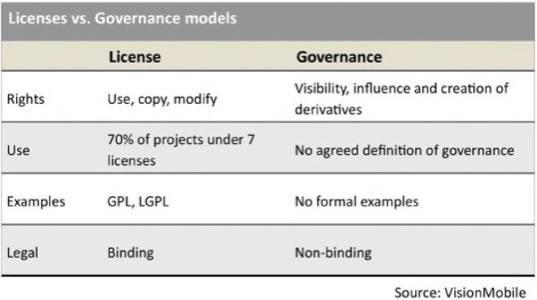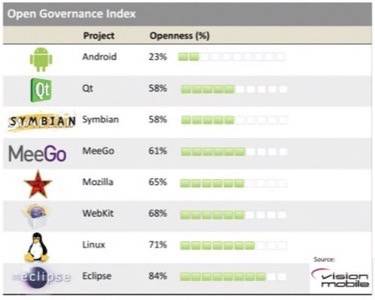A London-based research firm called VisionMobile has released a new method of tracking “openness” among mobile platforms called the Open Governance Index. According to its metrics, Android is the least “open” of all the supposedly open source mobile platforms, with a 23% openness rating. Eclipse, an open development platform comprise of extensible networks and tools, was rated the most open at 84%.

The irony of Eclipse being the most open development framework is that many Android app developers code with the platform in combination with Google’s Android Developer Tools (ADT) Plugin. It is not uncommon in the open-source community to use multiple tools for multiple frameworks (downstream production) to accomplish something that is, ostensibly, not that open. For instance, as much as Android is not “open,” it uses open source projects like WebKit and the Linux kernel to perform many of its key functions.
VisionMobile uses “governance” as opposed to “licenses” as what it thinks is the best way to track openness. It defines governance with four main principles in mind:
From the report:
1. Access: availability of the latest source code, developer support mechanisms, public roadmap, and transparency of decision-making.
2. Development: the ability of developers to influence the content and direction of the project.
3. Derivatives: the ability for developers to create and distribute derivatives of the source code in the form of spin-off projects, handsets or applications.
4. Community: a community structure that does not discriminate between developers.
On the other end, licenses determine the right to use, copy and modify an open source project. VisionMobile points out that 70% of open source projects allow use of seven or less licenses.

After Eclipse, the next most open mobile projects according to the index are Linux (71%), WebKit (68%) and Mozilla (65%).
VisionMobile believes one of the keys to long term success will be how open a platform is. Granted, the firm might have a biased interest in that statement and the market does not bear the same facts. Open source projects have done well, such as Mozilla’s initiatives, but others such as mobile operating system MeeGo (61%) and Symbian (58%) have watched development resources (MeeGo) and market share (Symbian) fade away. Hence, Android is a paradox in VisionMobile’s formula.

To its credit, the research firm acknowledges this. The explanation for Android’s success has a lot more to do with Google’s billions than it does with how “open” the platform actually is. Look at iOS. It is proprietary to Apple and is based off of Unix and written in Objective-C language. The development platform, Xcode, is licensed to developers. There is very little about iOS that is open and yet Apple is riding its success to be one of the biggest corporations the world has ever seen.
VisionMobile is an independent market analysis and strategy firm. The research for the Open Governance Index was funded in part by Webinos, a project funded by the European Union to deliver Web applications to mobile, PC, TV and automobiles. The full report details the history and economics of open source development and breaks down each one of the mobile entries in-depth on the four aspects of governance.

















